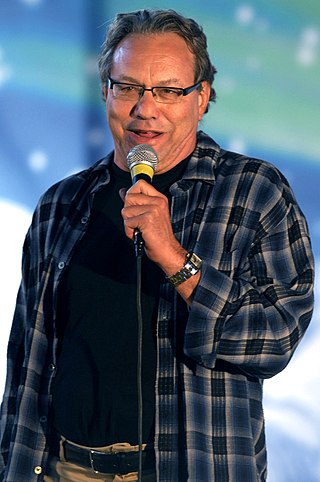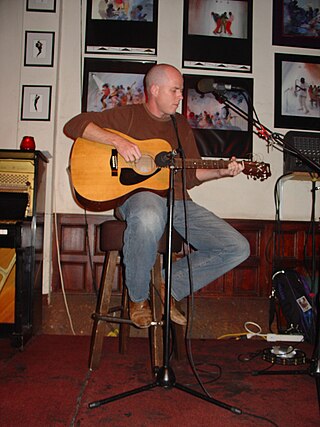
William Melvin Hicks was an American stand-up comedian and satirist. His material—encompassing a wide range of social issues including religion, politics, and philosophy—was controversial and often steeped in dark comedy.

Stand-up comedy is a comedic performance to a live audience in which the performer addresses the audience directly from the stage. The performer is known as a comedian, comic, or stand-up. It is usually a rhetorical performance but many comics employ crowd interaction as part of their set or routine.

A comedian or comic is a person who seeks to entertain an audience by making them laugh. This might be through jokes or amusing situations, or acting foolish, or employing prop comedy. A comedian who addresses an audience directly is called a stand-up comedian.

Lewis Niles Black is an American stand-up comedian and actor. His comedy routines often escalate into angry rants about history, politics, religion, and cultural trends.

The tradition of humor in Judaism dates back to the Torah and the Midrash from the ancient Middle East, but generally refers to the more recent stream of verbal and often anecdotal humor of Ashkenazi Jews which took root in the United States over the last hundred years, including in secular Jewish culture. European Jewish humor in its early form developed in the Jewish community of the Holy Roman Empire, with theological satire becoming a traditional way of clandestinely opposing Christianization.

Mitchell Lee Hedberg was an American stand-up comedian known for his surreal humor and deadpan delivery. His comedy typically featured short, sometimes one-line jokes mixed with absurd elements and non sequiturs.

A heckler is a person who harasses and tries to disconcert others with questions, challenges, or gibes. Hecklers are often known to shout discouraging comments at a performance or event, or to interrupt set-piece speeches, with the intent of disturbing performers and/or participants.

Self-referential humor, also known as self-reflexive humor, self-aware humor, or meta humor, is a type of comedic expression that—either directed toward some other subject, or openly directed toward itself—is self-referential in some way, intentionally alluding to the very person who is expressing the humor in a comedic fashion, or to some specific aspect of that same comedic expression. Here, meta is used to describe that the joke explicitly talks about other jokes, a usage similar to the words metadata, metatheatrics and metafiction. Self-referential humor expressed discreetly and surrealistically is a form of bathos. In general, self-referential humor often uses hypocrisy, oxymoron, or paradox to create a contradictory or otherwise absurd situation that is humorous to the audience.

Off-color humor is humor that deals with topics that may be considered to be in poor taste or vulgar. Many comedic genres may incorporate "off-color" elements.

An open mic or open mike is a live show at a venue such as a coffeehouse, nightclub, comedy club, strip club, or pub, usually taking place at night, in which audience members may perform on stage whether they are amateurs or professionals, often for the first time or to promote an upcoming performance. As the name suggests, performers are usually provided with a microphone plugged into a PA system so that they can be heard by the audience.
Observational comedy is a form of humor based on the commonplace aspects of everyday life. It is one of the main types of humor in stand-up comedy. In an observational comedy act, the comedian makes an observation about something which is common enough to be familiar to their audience, but not commonly discussed. Such observations are typically presented with the phrase "Have you ever noticed...?" or "Did you ever notice...?" which has become a comedy cliché.
Hack is a term used primarily in stand-up comedy, but also sketch comedy, improv comedy, and comedy writing to refer to a joke or premise for a joke that is considered obvious, has been frequently used by comedians in the past and/or is blatantly copied from its original author. Alternatively, it may refer to a comedian or performance group that uses hack material or similarly unoriginal devices in their act. Since comedians and people who work with comedians are typically exposed to many more jokes than the general public, they may recognize a topic, joke or performer as hack before the general public does; as a result, even performers who do well on stage may be considered hacks by their peers.
Joke theft is the act of performing and taking credit for comic material written or performed by another person without their consent and without acknowledging the other person's authorship. This may be a form of plagiarism and can, in some cases, be copyright infringement. A comic who is known to steal jokes may be labelled with the epithet "hack" by other comics. A "hack comic" uses material that is unoriginal or which is blatantly copied from its original author.
Anti-humor is a type of indirect and alternative humor that involves the joke-teller's delivering something that is intentionally not funny, or lacking in intrinsic meaning. The practice relies on the expectation on the part of the audience of something humorous, and when this does not happen, the irony itself is of comedic value — humor can be, and often is, about unexpected contrast (see Theories of humor § Incongruous juxtaposition theory). Anti-humor is also the basis of various types of pranks and hoaxes.

Comedy is a genre of fiction that consists of discourses or works intended to be humorous or amusing by inducing laughter, especially in theatre, film, stand-up comedy, television, radio, books, or any other entertainment medium. The term originated in ancient Greece: In Athenian democracy, the public opinion of voters was influenced by political satire performed by comic poets in theaters. The theatrical genre of Greek comedy can be described as a dramatic performance pitting two groups, ages, genders, or societies against each other in an amusing agon or conflict. Northrop Frye depicted these two opposing sides as a "Society of Youth" and a "Society of the Old". A revised view characterizes the essential agon of comedy as a struggle between a relatively powerless youth and the societal conventions posing obstacles to his hopes. In this struggle, the youth then becomes constrained by his lack of social authority, and is left with little choice but to resort to ruses which engender dramatic irony, which provokes laughter.
Tommy Moore is an American comedian, clown, and motivational speaker versed in the styles of vaudeville and Catskill comedy. His act is filled with classic jokes, original material, props, costumes, improv, and misguided magic, drawing heavily on audience participation. Billed as The Professor of Fun, he has been called the "man who put the FUN back in Funny".
Women in comedy refers to women who participate in comedic works as well as their experience within the social environment. While primarily dominated by men throughout history, women have been represented in the field of comedy since the mid-1700s. Comedy, or creative works with the intention of humor, is thought to have originated in ancient Greek theatre in 425 BCE. Some of the first figures to enter the field, however, were faced with resistance and discrimination. A sense of humor in women was previously thought to have meant the ability to laugh at a man's joke, rather than to tell the joke herself. When women did finally enter comedy, it was seen as niche, thus making bookings hard to come by.
Clean comedy is a comedy genre that is generally free of ribaldry: racism, rape jokes, pejoratives, profanity, obscenity, incest, illicit drugs, off-color humor, toilet humor, explicitly sexual content, and similarly objectionable material. Comedians may try to circumvent clean-comedy restrictions by using innuendos, euphemisms, doublespeak, double entendres, and gender-neutral language. Clean comedy is not necessarily unprovocative.
Television comedy is a category of broadcasting that has been present since the early days of entertainment media. While there are several genres of comedy, some of the first ones aired were variety shows. One of the first United States television programs was the comedy-variety show Texaco Star Theater, which was most prominent in the years that it featured Milton Berle - from 1948 to 1956. The range of television comedy has become broader, with the addition of sitcoms, improvisational comedy, and stand-up comedy, while also adding comedic aspects into other television genres, including drama and news. Television comedy provides opportunities for viewers to relate the content in these shows to society. Some audience members may have similar views about certain comedic aspects of shows, while others will take different perspectives. This also relates to developing new social norms, sometimes acting as the medium that introduces these transitions.











